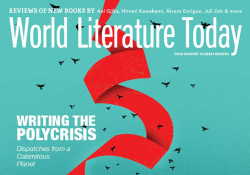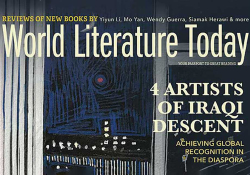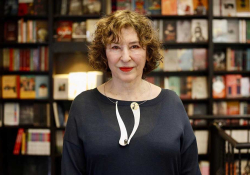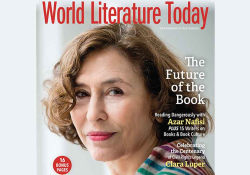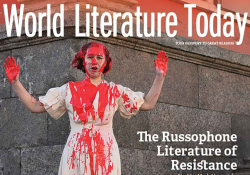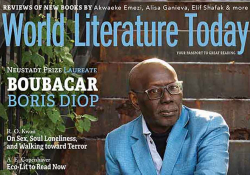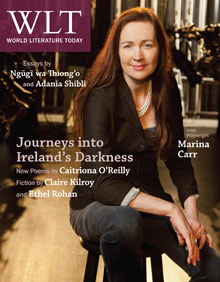EDITOR'S NOTE

The unbearable darkness of being.” That’s what the plays of Marina Carr, the 2012 Puterbaugh Fellow (page 42), are about, according to Melissa Sihra, professor of drama at Trinity College Dublin. Whereas for Kundera life is unbearably light, full of laughter and forgetting, for Carr there is a pitch-black darkness that haunts our living. Out of that darkness, however, she steals fire from the gods and watches her characters’ hearts torn out, not by an eagle wheeling down from the sky, but by our human capacity for cruelty toward one another. Our only consolation in being chained to the rock lies in being chained with others around us, which constitutes both the misery and splendor of being alive.
Marina Carr’s artistic roots in the Irish Midlands run deep. Her father is a novelist and playwright, while her mother was a poet, musician, and schoolteacher. One of six children, at night, while lying in bed, she would listen to her mother play the violin and piano. During the day, she and her siblings would escape to a backyard shed, where they set up a theater by “laying boards across stacked turf, hanging an old blue sheet for a curtain, and tying a bicycle lamp to a rafter.” The dramas they invented were “bloody and brutal . . . strange and free and cruel,” she writes, and yet everyone “lived happily ever after” in the end. She suspected at a young age that “morality is a human invention, fallible and variable as the wind.” Still, the young playwright knew that a sense of justice must be restored at the end of the play, “some sort of botched order and harmony” (Plays One, 1999).
Carr continued writing for the theater while still in high school, graduated from University College Dublin in 1987 with majors in English and philosophy, and had four of her early plays produced in Dublin in the late 1980s and early 1990s. She then moved away from the city and spent three years “in the wilderness,” as she calls it, reading the classics and even spending a year on the island of Inishnee in Galway, which sounds like a Yeatsian idyll. Then, from 1994 to 2000, she wrote a series of plays that established her reputation as one of Ireland’s most important playwrights since Beckett, and has now published sixteen plays altogether.
In a 1998 essay called “Dealing with the Dead,” Carr pays homage to her literary masters, whom she calls the “royal writers,” authors who “talk back and forth across the centuries in an endless conversation”: the poets Homer, Keats, and Dickinson, and the writers she calls “poets of the theatre,” including Chekhov, Ibsen, Tennessee Williams, Wilde, Beckett, and Shakespeare. “These warriors of the desk,” she writes, “these songstitchers, these myth finders, while scaring you with their formidable gifts, do also bolster the heart, especially in this anti-heroic age where the all-consuming intellectual pursuit seems to be that of demystification” (Irish University Review, Spring 1998).
For all the darkness in her plays, I think the enduring figure in her work is that of the songstitcher. As Beckett once wrote, “When you are in the last bloody ditch, there is nothing left but to sing.” In By the Bog of Cats, the songstitcher is Big Josie Swane, Hester’s mother, who lays her infant child in a black swan’s lair and herself is described as having “a powerful neck all knotted that she’d stretch like a swan.” And in her latest play, Phaedra Backwards, Carr reimagines the figure of Ariadne as a bone carrier who wants to be “hung in an open place where the wind can play all the notes” through her, like a wind chime in a willow tree. As a songstitcher herself, Carr has her characters powerfully embody lyric in the breath and force of her lines—despite being “whittled to the bone,” they cling to a world not entirely of their own making. In Carr’s plays, the darkness may be unbearable, but the harp hanging from the willow tree continues to sound, demanding that we listen.
